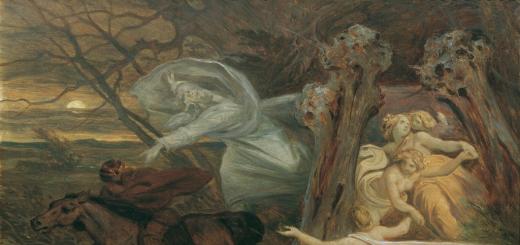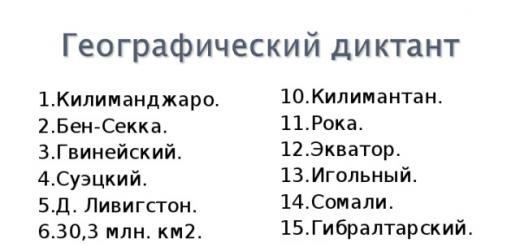The Unified State Examination in the Russian language is a mandatory exam. In total, 616,590 people took part in the main period of the Unified State Examination in the Russian language in 2017 (in 2016 - 658,392 people; in 2015 - 672,407 people).
The results of the Unified State Examination in the Russian language in 2017 are generally comparable with the results of the Unified State Examination of previous years.
On the official website of FIPI, in the section “Analytical and methodological materials”, “Methodological recommendations for teachers, prepared on the basis of an analysis of typical mistakes of participants in the Unified State Exam 2017” have been published, this is where you can find information about What was the average Unified State Exam score in Russian in 2017?.
Download the document.
Table 1
Average Unified State Examination score in Russian language 2015 - 2017
| Year | Average Test Score | Test Score Range | ||||
| 0–20 | 21–40 | 41–60 | 61–80 | 81–100 | ||
| 2017 | 69,06 | 0,43% | 2,62% | 23,61% | 48,30% | 25,04% |
| 2016 | 68,5 | 0,82% | 3,40% | 24,45% | 45,75% | 25,58% |
| 2015 | 66,16 | 1,69% | 4,79% | 26,98% | 46,75% | 19,80% |
The share of examinees who scored 100 points on the exam remained unchanged compared to 2016 – 0.5%. The share of high-scorers also remains stable: 25.5% in 2016 and 25% in 2017.
In 2017, the share of graduates who did not pass the minimum threshold (who did not receive the minimum (24) test score) decreased by 0.5%: from 0.99% (2016) to 0.54% (2017). The main reasons for the decrease in the share of such participants in the Russian language include the successful implementation of the Rosobrnadzor system of measures to improve the quality of teaching the Russian language in the constituent entities of the Russian Federation. Data on changes in the number and share of 100-point students in 2015–2017. are given in table. 2.
table 2
Statistics on the performance of work as a whole and individual tasks make it possible to identify the main problems in the preparation of examinees in the Russian language. As in previous years, sections of the course related to the formation of communicative competence remain insufficiently mastered. Insufficiently developed skills of analytical work with words and text, the lack of sufficient practice in analyzing linguistic phenomena also affect the quality of writing an argumentative essay. Graduates experience the greatest difficulties when applying punctuation and spelling standards in written speech.
The website “Teach at School” presents an interesting article Average USE score 2017 in the Russian language, based on other data from the Internet.
At the end of May, 11th grade graduates will face a rather difficult test - Unified State Exam in Russian language 2017. This exam is considered compulsory, just like mathematics, so everyone without exception will have to take it. Today, the main task for eleventh-graders is to prepare for the test in a timely manner so that the certificate is not spoiled by a bad grade. In addition, a high score on the Unified State Exam in Russian opens doors to the most prestigious universities in the country for a future applicant.
Most students, assuming that Russian language tests are not as difficult as mathematics or physics, do not prepare at all for the subject and end up with insufficiently high scores. It must be remembered that the exam covers not only materials for grade 11, but also topics from previous years of study. In addition, the Unified State Exam includes tasks that require extraordinary thinking. As you can see, the Russian language is not such a simple subject, and given the future ones predicted for 2017, it will become even more difficult.
What should you prepare for?
It has been said more than once that a number of innovations await the Russian language tests. Over the years, scientists and teachers have been developing an optimal knowledge testing system that could reflect the real knowledge of students. In 2017, they plan to introduce an oral part in the Unified State Exam in Russian. This has already been stated by Lyudmila Verbitskaya (head of the Russian Academy of Education).
At this stage, all the necessary transformations have already been developed. All that remains is to understand how to rationally use them in this .
Until 2017, all secondary school students took the Russian language test in written form. The test form that was included in the forms is, of course, a good thing, but it is not capable of reflecting the real knowledge of graduates, because they can simply guess the answer. But what about punctuation or spelling? Tests are not capable of thoroughly demonstrating a student’s literacy.
An oral exam will help identify gaps in knowledge, the ability to accurately express one’s thoughts, put words together into sentences, and write a narrative that is understandable to the examiners.
Nowadays, correct speech delivery is extremely important, especially in sectors of the economy. Any leader must be able to formulate tasks for subordinates, be able to express thoughts and convey his ideas to others. Just for this, every schoolchild must learn spelling, as well as learn the basics of oratory.
The oral block is not all the changes that await the Russian language exam. In the approaching 2017, officials intend to introduce a grading system for test essays. Let us remind you that at the moment, for the manifestation of creative abilities and the ability to logically construct one’s own thoughts, the student simply received a “pass” or “fail”.
Lyudmila Verbitskaya considers this an unfair approach, especially for those students who can show the level of their knowledge through an essay. Only the introduction of a clear rating scale will help to clearly recognize the student’s level of preparedness and form a clear, objective view of the exam.
Dates
Early exams will begin on May 25, 2017. It is during this period that eleventh graders will be able to take the Russian language test. The main tests are scheduled for May 30. Retake For those who “failed” a subject or want to improve their grade, they will have the opportunity to take the retake exam on June 27. The reserve days are April 15 and September 24.
Conducting the Unified State Examination in the Russian language
Students are given an hour to complete all tasks. In the allotted time, you must solve all two blocks, which include 24 questions. The first block consists of questions that must be answered digitally or verbally. On the second form, students must write an essay on a given topic.
Rating scale

Back in 2015, you could get a “pass/fail” rating for this test. Already in 2016, points appeared, the amount of which depended on the number of correct answers. From the table below, you can find out the exact number of points you can get for a particular question.
The second part of the exam requires the student to demonstrate creative abilities and fluency in the Russian language. Please note that essays are assessed in a special way, so grammar alone will not surprise the examiner.
For a correctly completed second part of the exam, a student can earn 25 points. In total, over two blocks the graduate will earn 57 points, to which points for other criteria are added. Considering that the knowledge assessment system is 100-point, in order to understand what grade a student earned, just refer to this scheme:
- 0 - 24 - “two”
- 25 - 57 - “troika”
- 58 - 71 - “four”
- from 72 - “five”
Note that the minimum number of points for admission to a university is only 36 points, but to obtain a certificate it is enough to score 24 points.
Materials for preparing for the Unified State Exam in Russian

Nowadays, a lot of literature is published annually to help future graduates prepare for the exam. In addition, a lot of additional materials are provided for public access on the official FIPI website, namely:
- Demo version of the exam
- Assignment forms
- Training collections
- Video consultations
Among the most optimal literature for preparation, it is worth highlighting the manual from the author Tsybulko I.P.
Today, the main task for eleventh-graders is to prepare for the test in a timely manner so that the certificate is not spoiled by a bad grade. In addition, a high score on the Unified State Exam in Russian opens doors to the most prestigious universities in the country for a future applicant.
Conducting the Unified State Exam 2017 in Russian
Students are given an hour to complete all tasks. In the allotted time, you must solve all two blocks, which include 24 questions. The first block consists of questions that must be answered digitally or verbally. On the second form, students must write an essay on a given topic.
Unified State Exam 2017 tickets in Russian language
ATTENTION! ANSWERS TO ALL QUESTIONS ARE AT THE BOTTOM OF THE ARTICLE.
Unified State Exam 2017 in Russian. Question 1
Indicate two sentences that correctly convey HOME information contained in the text.
1. In tropical, equatorial and subequatorial latitudes, the air currents encountered bring large amounts of precipitation to the region at any time of the year, which is combined with a hot climate.
2. Tropical forest - a forest distributed in the tropical, equatorial and subequatorial zones, which are characterized by high rainfall and a hot climate, which creates conditions for the growth of luxurious lush vegetation.
3. Tropical forest - a forest distributed in the tropical, equatorial and subequatorial zones, which is characterized by lush vegetation.
4. Tropical forest grows in tropical, equatorial and subequatorial latitudes, where high rainfall combined with a hot climate creates conditions for the growth of luxurious lush vegetation.
5. Tropical areas are characterized by luxurious lush vegetation.
Unified State Exam 2017 in Russian. Question 2
Read the text and complete tasks 1-3.
(1) Tropical forest - forest distributed in the tropical, equatorial and subequatorial zones. (2) At these latitudes, the air currents encountered bring large amounts of precipitation to the region at any time of the year, combined with a hot climate. (3) ... tropical areas are characterized by luxurious, lush vegetation.
Which of the following words (combinations of words) should be in the blank in the third (3) sentence?
2. Therefore
Unified State Exam 2017 in Russian. Question 3
Read the text and complete tasks 1-3.
(1) Tropical forest - forest distributed in the tropical, equatorial and subequatorial zones. (2) At these latitudes, the air currents encountered bring large amounts of precipitation to the region at any time of the year, combined with a hot climate. (3) ... tropical areas are characterized by luxurious, lush vegetation.
Read a fragment of a dictionary entry that gives the meaning of the word BELT. Determine the meaning in which this word is used in the first (1) sentence of the text. Indicate the number corresponding to this value in the given fragment of the dictionary entry.
BELT, -a, -ov.
1. Ribbon, cord, belt or stitched strip of fabric for tying or fastening at the waist. Leather p.
2. transfer. The space that surrounds or encircles something. Forest Park (green) village of the capital.
3. Space allocated within the territory of the country on the basis of some. own characteristics. Tariff p.
4. Selected for some reason. sign of a part of the earth's surface (between some parallels or between two meridians), as well as a part of the celestial sphere. .
Unified State Exam 2017 in Russian. Question 4
In one of the words below there is an error in the emphasis: WRONG The letter denoting the stressed vowel sound is highlighted. Enter this word.
2. spoiled
3. run out
4. click
5. news
Unified State Exam 2017 in Russian. Question 5
In one of the sentences belowWRONGThe highlighted word is used. Correct the lexical error by choosing a paronym for the highlighted word. Write down the chosen word.
THE INSTITUTOR of the Russian National Theater A. N. Ostrovsky managed to convey the spirit of Moscow beyond Moscow in his plays.
During the Russian language lesson, sixth graders wrote DICTATION.
You should not lose heart when faced with ordinary LIFE difficulties.
At the film festival, the film by the Russian director received the AUDIENCE CHOICE award.
Many SUBSCRIBERS of the telephone network were unhappy due to problems on the line.
Unified State Exam 2017 in Russian. Question 6
In one of the words highlighted below, an error was made in the formation of the word form.Correct the mistakeand write the word correctly.
more than FIVE HUNDRED rubles
pair of STOCKINGS
necessary ADDRESSES
sign CONTRACTS
kilogram of TOMATOES
Unified State Exam 2017 in Russian. Question 7
Establish a correspondence between grammatical errors (indicated by letters) and the sentences in which they were made (indicated by numbers).
Grammatical errors
A) an error in constructing a sentence with homogeneous members
B) violation in the construction of sentences with participial phrases
C) incorrect construction of sentences with indirect speech
D) violation of the type-temporal correlation of verb forms
D) incorrect construction of a sentence with an adverbial phrase
Offers
1) Emigrant writers often published their works in the magazine “Modern Notes”.
2) Looking back, mistakes made often seem insignificant.
3) Bunin often stated that I have an irreconcilable attitude towards avant-garde movements in literature.
4) After reading the educational literature, I passed the exam with flying colors.
5) A boat sailing past me caught my attention.
6) He loved not only football, but also hockey.
7) Anyone who has prepared well for the exams will easily enter the university.
8) The boy looks at me in surprise and took a step towards me.
9) The famous philologist V.V. Vinogradov said that he considers it his duty to instill a love for the Russian language.
Unified State Exam 2017 in Russian. Question 8
Identify the word in which the unstressed alternating vowel of the root is missing. Write out this word by inserting the missing letter.
fascinated
estate
scholarship
fall asleep
n..riphery
Unified State Exam 2017 in Russian. Question 9
Identify the row in which the same letter is missing in both words. Write out these words by inserting the missing letter. Write your answer without spaces, commas or other punctuation marks.
ra..look, be..color
pr..breezy, pr..sweet
pr..grandfather, pick up..pick up
pre..July, up..mother
un..skat, counter..gra
Unified State Exam 2017 in Russian. Question 10
E.
1. dependent
2. view..watch
3. aluminum
4. handsome
5. glued..in
Unified State Exam 2017 in Russian. Question 11
Indicate the word in which a letter is written in place of the blank I.
1. (they) fight...
2. petting (dog)
3. (they) count..t
5. (they) cle..t
Unified State Exam 2017 in Russian. Question 12
Identify the sentence in which NOT is written with the wordFULL. Open the brackets and write down this word.
It seemed to him that he had never (NOT) LEFT his hometown, and everything seemed strangely familiar to him.
A (UN)FAMILIAR citizen with a kind face was walking straight towards him, holding a chair suspended like a cello.
He arrived in a new area, looking around in amazement and (NOT) UNDERSTANDING anything.
The (un)known surroundings beckoned me.
The girl inflated a (NOT) BLUE, but a red ball.
Unified State Exam 2017 in Russian. Question 13
Identify the sentence in which both highlighted words are writtenFULL. Open the brackets and write out these two words without spaces, commas or other punctuation marks.
(AFTER) THEN nurses came out of the car, (IN)INSTANTLY rushing to help the victims.
(B) FOR ten minutes it rained horribly, (B) SOON, however, it stopped.
(NOT) DESPITE the failure, the gold miners STILL continued to sift the sand.
(JUST) Like my cousin, I swim for a (LONG) LONG time on a hot summer day.
Peter did not understand (IN) LATIN well, (FOR) THEN he was good at the ancient Greek language.
Unified State Exam 2017 in Russian. Question 14
Indicate all the numbers in whose place it is writtenNN. Write the numbers in a row without spaces, commas or other punctuation marks in ascending order.
Nikolai jumped up, covered in smudges up to his neck.(1) covered in snow, and with horror threw away the dirt(2) oh blood of silver(3) oh gun.
Unified State Exam 2017 in Russian. Question 15
Place punctuation marks. Specify two sentences in which you need to put ONE comma.
Select 2 options from the list.
1. Towards evening, the noise died down and a blissful silence settled in the city.
2. We drove under the bridge and a majestic panorama of the capital city unfolded before the travelers.
3. The pyramids attract hundreds of tourists not only with their majestic appearance but also with their mysterious history.
4. Ippolit Matveyevich put his lean legs into pre-war piece trousers and plunged into short soft boots with narrow and tight toes.
5. The enchanting aroma of magnolias, gillyflowers and orchids floated in the air.
Unified State Exam 2017 in Russian. Question 16
Place punctuation marks:indicate all the numbers that should be replaced by commas in the sentence. Write the numbers in a row without spaces, commas or other punctuation marks in ascending order.
The man soon left the house(1) hoping to forget(2) about what happened this morning(3) meeting.
Unified State Exam 2017 in Russian. Question 17
Place punctuation marks: indicate all the numbers that should be replaced by commas in the sentences. Write the numbers in a row without spaces, commas or other punctuation marks in ascending order.
So (1) my dear reader(2) We (3) in the end (4) reached the shore(5) however (6) We never found any people there(7) much to our chagrin.
Unified State Exam 2017 in Russian. Question 18
Place punctuation marks
Recently there were festive events dedicated to N.I. Pirogov(1) With name (2) whom (3) many revolutionary discoveries in the field of medicine are associated.
Unified State Exam 2017 in Russian. Question 19
Place punctuation marks: indicate all the numbers that should be replaced by commas in the sentence. Write the numbers in a row without spaces, commas or other punctuation marks in ascending order.
We had dinner (1) And (2) when we were alone(3) I told him my adventures(4) and told about his sorrows(5) that have been following me all this time.
Unified State Exam 2017 in Russian. Question 20
To swallow...(According to F. M. Dostoevsky ^{*} ∗ )
^{*} ∗ Fedor Mikhailovich Dostoevsky
Which of the statements correspond to the content of the text?
Select 2 options from the list.
1. Children from an early age absorb the most complex concepts and the child understands the deep things of life well.
3. Russian people often behave inappropriately in society.
4. People who behave poorly in society do not cause negative emotions in people.
5. Of the children who attended the ball, the author liked the teenagers the most.
Unified State Exam 2017 in Russian. Question 21
Read the text and complete tasks 20–24.
(1) Of course, I won’t describe the Christmas tree and dancing in the artists’ club in detail; all this was described a long time ago and at one time, so I myself read with great pleasure in other feuilletons. (2) I will only say that for too long before I had not been anywhere, in any meeting, and had lived in solitude for a long time.(3) First the children danced, all in lovely costumes. (4) It is interesting to observe how the most complex concepts are instilled in a child quite imperceptibly, and he, not yet able to connect two thoughts, sometimes perfectly understands the deepest things in life. (5) One learned German said that every child, reaching the first three years of his life, already acquires a whole third of those ideas and knowledge with which he will go to the grave as an old man. (6) There were even six-year-old children here, but I probably know that they already understood perfectly: why and why they came here, dressed up in such expensive dresses, and at home they walk around dirty (with the current means of average society - certainly dirty). (7) They probably already understand that this is exactly how it should be, that this is not an evasion at all, but a normal law of nature. (8) Of course, they won’t express it in words, but they know it internally, and this, however, is an extremely complex thought.
(9) Of the children, I liked the little ones best; They were very sweet and cheeky. (10) The older ones are already cheeky with some insolence. (11) Of course, the future middle and mediocrity were the most cheeky and funniest of all; this is already a general law: the middle is always cheeky, both in children and in parents. (12) The more gifted and isolated children are always more restrained, or if they are cheerful, then with the indispensable habit of leading others and commanding. (13) It’s also a pity that now everything is made so easy for children - not only any study, any acquisition of knowledge, but even games and toys. (14) As soon as the child begins to babble the first words, they immediately begin to make it easier for him. (15) All pedagogy has now gone into the concern for relief. (16) Sometimes relief is not development at all, but, on the contrary, it is dullness. (17) Two or three thoughts, two or three impressions, more deeply experienced in childhood, through one’s own effort (and, if you like, through suffering), will lead the child much deeper into life than the most lightweight school, from which very often nothing comes out neither this, neither good nor evil, even in depravity it is not depraved, and in virtue it is not virtuous.
(18) Have the oysters arrived? O joy!
(19) Gluttonous youth flies
To swallow...(20) This “gluttonous youth” (the only crappy verse in Pushkin because it is expressed completely without irony, but almost with praise) - this gluttonous youth is made of something? (21) Bad youth and undesirable, and I am sure that too easy an upbringing extremely contributes to its production; and we have so much of this goodness!
(22) But I liked everything extremely, and if only the teenagers had not jostled, then everything would have turned out to complete pleasure. (23) In fact, the adults are all festively and gracefully polite, and the teenagers (not children, but teenagers, future young people, in different uniforms, and of whom there were many) - push unbearably, without apologizing and passing by with every right. (24) They pushed me fifty times; Maybe they are taught this way to develop swagger in them. (25) Nevertheless, I liked everything, with a long habit, despite the terrible stuffiness, the electric sun and the frantic command cries of the ballet dance director.
(26) The other day I picked up one issue of the Petersburg Newspaper and in it I read correspondence from Moscow about scandals at holidays in the assembly of the nobility, in an artistic circle, in the theater, in a masquerade, etc. (27) If you only believe the correspondent (for the correspondent, while announcing vice, could with the intention of keeping silent about virtue), then our society has never been closer to a scandal than it is now. (28) And it’s strange: why is it that, even from my very childhood, and throughout my whole life, as soon as I found myself in a large festive gathering of Russian people, it always immediately began to seem to me that this was just their way, and suddenly they would take it, stand up and They will make a row, just like at home. (29) An absurd thought - and how I reproached myself for this thought even in childhood! (30) A thought that does not stand up to the slightest criticism. (31) Oh, of course, the merchants and captains about whom the truthful correspondent talks (I completely believe him) have existed before and have always been, this is an undying type; but still they were more afraid and hid their feelings, and now, no, no, and suddenly, into the very middle, such a gentleman will break through, who considers himself completely in the new right. (32) And it is indisputable that in the last twenty years even an awful lot of Russian people have suddenly imagined for some reason that they have received the full right to dishonor, and that this is now good, and that they will now be praised for this, and not taken out . (33) On the other hand, I also understand that it is extremely pleasant (oh, many, many!) to stand in the middle of a meeting, where everyone around, ladies, gentlemen and even the authorities, are so sweet in their speeches, so polite and equal to everyone that as if in fact in Europe - to stand in the middle of these Europeans and suddenly bark something in the purest national dialect, - to slap someone in the face, to do dirty tricks on a girl, and generally shit right there in the middle of the audience: “Here, they say, you’re two hundred years of Europeanism, and here we are, all as we were, haven’t disappeared anywhere!” (34) This is nice. (35) But still the savage will make a mistake: he will not be recognized and will be taken out. (According to F. M. Dostoevsky ^{*} ∗ )
^{*} ∗ Fedor Mikhailovich Dostoevsky (1821-1881) - classic of Russian literature.
Which of the following statements are true?
Select 2 options from the list.
1. Sentence 23 provides an explanation of what sentence 22 says.
2. Sentences 5-8 present the narrative.
3. Sentence 32 contains descriptive elements.
4. Sentences 20-21 present the reasoning.
5. Sentence 8 gives the reason for what is said in sentence 7.
Unified State Exam 2017 in Russian. Question 22
Read the text and complete tasks 20–24.
(1) Of course, I won’t describe the Christmas tree and dancing in the artists’ club in detail; all this was described a long time ago and at one time, so I myself read with great pleasure in other feuilletons. (2) I will only say that for too long before I had not been anywhere, in any meeting, and had lived in solitude for a long time.(3) First the children danced, all in lovely costumes. (4) It is interesting to observe how the most complex concepts are instilled in a child quite imperceptibly, and he, not yet able to connect two thoughts, sometimes perfectly understands the deepest things in life. (5) One learned German said that every child, reaching the first three years of his life, already acquires a whole third of those ideas and knowledge with which he will go to the grave as an old man. (6) There were even six-year-old children here, but I probably know that they already understood perfectly: why and why they came here, dressed up in such expensive dresses, and at home they walk around dirty (with the current means of average society - certainly dirty). (7) They probably already understand that this is exactly how it should be, that this is not an evasion at all, but a normal law of nature. (8) Of course, they won’t express it in words, but they know it internally, and this, however, is an extremely complex thought.
(9) Of the children, I liked the little ones best; They were very sweet and cheeky. (10) The older ones are already cheeky with some insolence. (11) Of course, the future middle and mediocrity were the most cheeky and funniest of all; this is already a general law: the middle is always cheeky, both in children and in parents. (12) The more gifted and isolated children are always more restrained, or if they are cheerful, then with the indispensable habit of leading others and commanding. (13) It’s also a pity that now everything is made so easy for children - not only any study, any acquisition of knowledge, but even games and toys. (14) As soon as the child begins to babble the first words, they immediately begin to make it easier for him. (15) All pedagogy has now gone into the concern for relief. (16) Sometimes relief is not development at all, but, on the contrary, it is dullness. (17) Two or three thoughts, two or three impressions, more deeply experienced in childhood, through one’s own effort (and, if you like, through suffering), will lead the child much deeper into life than the most lightweight school, from which very often nothing comes out neither this, neither good nor evil, even in depravity it is not depraved, and in virtue it is not virtuous.
(18) Have the oysters arrived? O joy!
(19) Gluttonous youth flies
To swallow...(20) This “gluttonous youth” (the only crappy verse in Pushkin because it is expressed completely without irony, but almost with praise) - this gluttonous youth is made of something? (21) Bad youth and undesirable, and I am sure that too easy an upbringing extremely contributes to its production; and we have so much of this goodness!
(22) But I liked everything extremely, and if only the teenagers had not jostled, then everything would have turned out to complete pleasure. (23) In fact, the adults are all festively and gracefully polite, and the teenagers (not children, but teenagers, future young people, in different uniforms, and of whom there were many) - push unbearably, without apologizing and passing by with every right. (24) They pushed me fifty times; Maybe they are taught this way to develop swagger in them. (25) Nevertheless, I liked everything, with a long habit, despite the terrible stuffiness, the electric sun and the frantic command cries of the ballet dance director.
(26) The other day I picked up one issue of the Petersburg Newspaper and in it I read correspondence from Moscow about scandals at holidays in the assembly of the nobility, in an artistic circle, in the theater, in a masquerade, etc. (27) If you only believe the correspondent (for the correspondent, while announcing vice, could with the intention of keeping silent about virtue), then our society has never been closer to a scandal than it is now. (28) And it’s strange: why is it that, even from my very childhood, and throughout my whole life, as soon as I found myself in a large festive gathering of Russian people, it always immediately began to seem to me that this was just their way, and suddenly they would take it, stand up and They will make a row, just like at home. (29) An absurd thought - and how I reproached myself for this thought even in childhood! (30) A thought that does not stand up to the slightest criticism. (31) Oh, of course, the merchants and captains about whom the truthful correspondent talks (I completely believe him) have existed before and have always been, this is an undying type; but still they were more afraid and hid their feelings, and now, no, no, and suddenly, into the very middle, such a gentleman will break through, who considers himself completely in the new right. (32) And it is indisputable that in the last twenty years even an awful lot of Russian people have suddenly imagined for some reason that they have received the full right to dishonor, and that this is now good, and that they will now be praised for this, and not taken out . (33) On the other hand, I also understand that it is extremely pleasant (oh, many, many!) to stand in the middle of a meeting, where everyone around, ladies, gentlemen and even the authorities, are so sweet in their speeches, so polite and equal to everyone that as if in fact in Europe - to stand in the middle of these Europeans and suddenly bark something in the purest national dialect, - to slap someone in the face, to do dirty tricks on a girl, and generally shit right there in the middle of the audience: “Here, they say, you’re two hundred years of Europeanism, and here we are, all as we were, haven’t disappeared anywhere!” (34) This is nice. (35) But still the savage will make a mistake: he will not be recognized and will be taken out. (According to F. M. Dostoevsky ^{*} ∗ )
^{*} ∗ Fedor Mikhailovich Dostoevsky (1821-1881) - classic of Russian literature.
From sentences 7-17, write down the stable combination(s). Write your answer without spaces, commas or other punctuation marks.
Unified State Exam 2017 in Russian. Question 23
Read the text and complete tasks 20–24.
(1) Of course, I won’t describe the Christmas tree and dancing in the artists’ club in detail; all this was described a long time ago and at one time, so I myself read with great pleasure in other feuilletons. (2) I will only say that for too long before I had not been anywhere, in any meeting, and had lived in solitude for a long time.(3) First the children danced, all in lovely costumes. (4) It is interesting to observe how the most complex concepts are instilled in a child quite imperceptibly, and he, not yet able to connect two thoughts, sometimes perfectly understands the deepest things in life. (5) One learned German said that every child, reaching the first three years of his life, already acquires a whole third of those ideas and knowledge with which he will go to the grave as an old man. (6) There were even six-year-old children here, but I probably know that they already understood perfectly: why and why they came here, dressed up in such expensive dresses, and at home they walk around dirty (with the current means of average society - certainly dirty). (7) They probably already understand that this is exactly how it should be, that this is not an evasion at all, but a normal law of nature. (8) Of course, they won’t express it in words, but they know it internally, and this, however, is an extremely complex thought.
(9) Of the children, I liked the little ones best; They were very sweet and cheeky. (10) The older ones are already cheeky with some insolence. (11) Of course, the future middle and mediocrity were the most cheeky and funniest of all; this is already a general law: the middle is always cheeky, both in children and in parents. (12) The more gifted and isolated children are always more restrained, or if they are cheerful, then with the indispensable habit of leading others and commanding. (13) It’s also a pity that now everything is made so easy for children - not only any study, any acquisition of knowledge, but even games and toys. (14) As soon as the child begins to babble the first words, they immediately begin to make it easier for him. (15) All pedagogy has now gone into the concern for relief. (16) Sometimes relief is not development at all, but, on the contrary, it is dullness. (17) Two or three thoughts, two or three impressions, more deeply experienced in childhood, through one’s own effort (and, if you like, through suffering), will lead the child much deeper into life than the most lightweight school, from which very often nothing comes out neither this, neither good nor evil, even in depravity it is not depraved, and in virtue it is not virtuous.
(18) Have the oysters arrived? O joy!
(19) Gluttonous youth flies
To swallow...(20) This “gluttonous youth” (the only crappy verse in Pushkin because it is expressed completely without irony, but almost with praise) - this gluttonous youth is made of something? (21) Bad youth and undesirable, and I am sure that too easy an upbringing extremely contributes to its production; and we have so much of this goodness!
(22) But I liked everything extremely, and if only the teenagers had not jostled, then everything would have turned out to complete pleasure. (23) In fact, the adults are all festively and gracefully polite, and the teenagers (not children, but teenagers, future young people, in different uniforms, and of whom there were many) - push unbearably, without apologizing and passing by with every right. (24) They pushed me fifty times; Maybe they are taught this way to develop swagger in them. (25) Nevertheless, I liked everything, with a long habit, despite the terrible stuffiness, the electric sun and the frantic command cries of the ballet dance director.
(26) The other day I picked up one issue of the Petersburg Newspaper and in it I read correspondence from Moscow about scandals at holidays in the assembly of the nobility, in an artistic circle, in the theater, in a masquerade, etc. (27) If you only believe the correspondent (for the correspondent, while announcing vice, could with the intention of keeping silent about virtue), then our society has never been closer to a scandal than it is now. (28) And it’s strange: why is it that, even from my very childhood, and throughout my whole life, as soon as I found myself in a large festive gathering of Russian people, it always immediately began to seem to me that this was just their way, and suddenly they would take it, stand up and They will make a row, just like at home. (29) An absurd thought - and how I reproached myself for this thought even in childhood! (30) A thought that does not stand up to the slightest criticism. (31) Oh, of course, the merchants and captains about whom the truthful correspondent talks (I completely believe him) have existed before and have always been, this is an undying type; but still they were more afraid and hid their feelings, and now, no, no, and suddenly, into the very middle, such a gentleman will break through, who considers himself completely in the new right. (32) And it is indisputable that in the last twenty years even an awful lot of Russian people have suddenly imagined for some reason that they have received the full right to dishonor, and that this is now good, and that they will now be praised for this, and not taken out . (33) On the other hand, I also understand that it is extremely pleasant (oh, many, many!) to stand in the middle of a meeting, where everyone around, ladies, gentlemen and even the authorities, are so sweet in their speeches, so polite and equal to everyone that as if in fact in Europe - to stand in the middle of these Europeans and suddenly bark something in the purest national dialect, - to slap someone in the face, to do dirty tricks on a girl, and generally shit right there in the middle of the audience: “Here, they say, you’re two hundred years of Europeanism, and here we are, all as we were, haven’t disappeared anywhere!” (34) This is nice. (35) But still the savage will make a mistake: he will not be recognized and will be taken out. (According to F. M. Dostoevsky ^{*} ∗ )
^{*} ∗ Fedor Mikhailovich Dostoevsky (1821-1881) - classic of Russian literature.
Among sentences 14-34, find one(s) that is related to the previous one using a subordinating conjunction and a particle. Write the number(s) of this sentence(s) in a row without spaces, commas or other punctuation in ascending order.
Unified State Exam 2017 in Russian. Question 24
Read the text and complete tasks 20–24.
(1) Of course, I won’t describe the Christmas tree and dancing in the artists’ club in detail; all this was described a long time ago and at one time, so I myself read with great pleasure in other feuilletons. (2) I will only say that for too long before I had not been anywhere, in any meeting, and had lived in solitude for a long time.(3) First the children danced, all in lovely costumes. (4) It is interesting to observe how the most complex concepts are instilled in a child quite imperceptibly, and he, not yet able to connect two thoughts, sometimes perfectly understands the deepest things in life. (5) One learned German said that every child, reaching the first three years of his life, already acquires a whole third of those ideas and knowledge with which he will go to the grave as an old man. (6) There were even six-year-old children here, but I probably know that they already understood perfectly: why and why they came here, dressed up in such expensive dresses, and at home they walk around dirty (with the current means of average society - certainly dirty). (7) They probably already understand that this is exactly how it should be, that this is not an evasion at all, but a normal law of nature. (8) Of course, they won’t express it in words, but they know it internally, and this, however, is an extremely complex thought.
(9) Of the children, I liked the little ones best; They were very sweet and cheeky. (10) The older ones are already cheeky with some insolence. (11) Of course, the future middle and mediocrity were the most cheeky and funniest of all; this is already a general law: the middle is always cheeky, both in children and in parents. (12) The more gifted and isolated children are always more restrained, or if they are cheerful, then with the indispensable habit of leading others and commanding. (13) It’s also a pity that now everything is made so easy for children - not only any study, any acquisition of knowledge, but even games and toys. (14) As soon as the child begins to babble the first words, they immediately begin to make it easier for him. (15) All pedagogy has now gone into the concern for relief. (16) Sometimes relief is not development at all, but, on the contrary, it is dullness. (17) Two or three thoughts, two or three impressions, more deeply experienced in childhood, through one’s own effort (and, if you like, through suffering), will lead the child much deeper into life than the most lightweight school, from which very often nothing comes out neither this, neither good nor evil, even in depravity it is not depraved, and in virtue it is not virtuous.
(18) Have the oysters arrived? O joy!
(19) Gluttonous youth flies
To swallow...(20) This “gluttonous youth” (the only crappy verse in Pushkin because it is expressed completely without irony, but almost with praise) - this gluttonous youth is made of something? (21) Bad youth and undesirable, and I am sure that too easy an upbringing extremely contributes to its production; and we have so much of this goodness!
(22) But I liked everything extremely, and if only the teenagers had not jostled, then everything would have turned out to complete pleasure. (23) In fact, the adults are all festively and gracefully polite, and the teenagers (not children, but teenagers, future young people, in different uniforms, and of whom there were many) - push unbearably, without apologizing and passing by with every right. (24) They pushed me fifty times; Maybe they are taught this way to develop swagger in them. (25) Nevertheless, I liked everything, with a long habit, despite the terrible stuffiness, the electric sun and the frantic command cries of the ballet dance director.
(26) The other day I picked up one issue of the Petersburg Newspaper and in it I read correspondence from Moscow about scandals at holidays in the assembly of the nobility, in an artistic circle, in the theater, in a masquerade, etc. (27) If you only believe the correspondent (for the correspondent, while announcing vice, could with the intention of keeping silent about virtue), then our society has never been closer to a scandal than it is now. (28) And it’s strange: why is it that, even from my very childhood, and throughout my whole life, as soon as I found myself in a large festive gathering of Russian people, it always immediately began to seem to me that this was just their way, and suddenly they would take it, stand up and They will make a row, just like at home. (29) An absurd thought - and how I reproached myself for this thought even in childhood! (30) A thought that does not stand up to the slightest criticism. (31) Oh, of course, the merchants and captains about whom the truthful correspondent talks (I completely believe him) have existed before and have always been, this is an undying type; but still they were more afraid and hid their feelings, and now, no, no, and suddenly, into the very middle, such a gentleman will break through, who considers himself completely in the new right. (32) And it is indisputable that in the last twenty years even an awful lot of Russian people have suddenly imagined for some reason that they have received the full right to dishonor, and that this is now good, and that they will now be praised for this, and not taken out . (33) On the other hand, I also understand that it is extremely pleasant (oh, many, many!) to stand in the middle of a meeting, where everyone around, ladies, gentlemen and even the authorities, are so sweet in their speeches, so polite and equal to everyone that as if in fact in Europe - to stand in the middle of these Europeans and suddenly bark something in the purest national dialect, - to slap someone in the face, to do dirty tricks on a girl, and generally shit right there in the middle of the audience: “Here, they say, you’re two hundred years of Europeanism, and here we are, all as we were, haven’t disappeared anywhere!” (34) This is nice. (35) But still the savage will make a mistake: he will not be recognized and will be taken out. (According to F. M. Dostoevsky ^{*} ∗ )
^{*} ∗ Fedor Mikhailovich Dostoevsky (1821-1881) - classic of Russian literature.
Read a fragment of a review based on the text that you analyzed while completing tasks 20–23.
This fragment examines the linguistic features of the text. Some terms used in the review are missing. Fill in the blanks (indicated by letters) with the necessary terms from the list (indicated by numbers).
“In his discussions about contemporary society, F. M. Dostoevsky uses such syntactic means as (A)___ (sentence 29) and (B)___ (sentences 11, 13). In addition, the author uses such a trope as (B)___ (deep life things in sentence 4, bad youth in sentence 21) and the lexical device (D)___ (sentence 17).”
List of terms
1) parcellation
2) rhetorical exclamation
3) metaphor
4) homogeneous members
5) dialectism
6) epiphora
7) epithet
8) comparative turnover
9) phraseology
Answers to the Unified State Exam 2017 in the Russian language
OGE 2017 in Russian language. Answer to question 1
Tropical forest is a forest distributed in the tropical, equatorial and subequatorial zones, which are characterized by high rainfall and a hot climate, which creates conditions for the growth of luxurious lush vegetation.
Tropical forest grows in tropical, equatorial and subequatorial latitudes, where high rainfall combined with a hot climate creates conditions for the growth of luxurious lush vegetation.
OGE 2017 in Russian language. Answer to question 2
That's why
OGE 2017 in Russian language. Answer to question 3
Selected for some reason. sign of a part of the earth's surface (between some parallels or between two meridians), as well as a part of the celestial sphere.Physico-geographical point Chasovoy point of the zodiac.
OGE 2017 in Russian language. Answer to question 4
spoiled
OGE 2017 in Russian language. Answer to question 5
initiator
OGE 2017 in Russian language. Answer to question 6
five hundred
OGE 2017 in Russian language. Answer to question 7
A - 6
B - 5
AT 3
G - 8
D 2
OGE 2017 in Russian language. Answer to question 8
touch
OGE 2017 in Russian language. Answer to question 9
considercolorless
OGE 2017 in Russian language. Answer to question 10
ALUMINUM
OGE 2017 in Russian language. Answer to question 11
GLUE
OGE 2017 in Russian language. Answer to question 12
unfamiliar
OGE 2017 in Russian language. Answer to question 13
then instantly
OGE 2017 in Russian language. Answer to question 14
OGE 2017 in Russian language. Answer to question 15
We drove under the bridge and a majestic panorama of the capital city unfolded before the travelers.
The pyramids attract hundreds of tourists not only with their majestic appearance but also with their mysterious history.
OGE 2017 in Russian language. Answer to question 16
OGE 2017 in Russian language. Answer to question 17
1257
OGE 2017 in Russian language. Answer to question 18
OGE 2017 in Russian language. Answer to question 19
1235
OGE 2017 in Russian language. Answer to question 20
Children from an early age absorb the most complex concepts and the child understands the deep things of life well.
Russian people often behave inappropriately in society.
OGE 2017 in Russian language. Answer to question 21
Sentence 23 explains what Sentence 22 says.
Sentences 20-21 present the reasoning.
OGE 2017 in Russian language. Answer to question 22
completely next to nytonis
OGE 2017 in Russian language. Answer to question 23
OGE 2017 in Russian language. Answer to question 24










